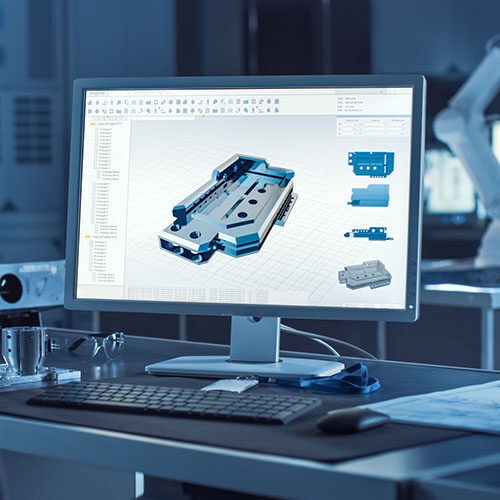
The new normal
As we continue to fight COVID-19 and deal with the effects of the pandemic, we are all adjusting to a new normal. With the emergence of the coronavirus, what most of us consider normal has already radically shifted, and we may never go back to how the world was before.
Manufacturers, like other businesses, are learning to adapt to this new world full of uncertainty, including disruptions throughout their businesses and supply chains, as well as to new workplace regulations and routines that are fundamentally changing how manufacturers operate.
Short-term measures taken in response to global crises can also lead to changes that last for years to come — government responses to the Great Depression and WWII have greatly shaped our financial systems, the manufacturing industry, and consumer behavior over the last decades — meaning changes and responses brought in now to combat COVID-19 may be with us for the foreseeable future.
Manufacturers who understand and act on the new normal will survive, and have opportunities to grow their businesses in the future.
The impact of COVID-19 on the manufacturing industry
The manufacturing industry has been extremely impacted by the COVID-19 crisis — with further fallout expected to come. In a recent survey conducted by the National Association of Manufacturers, almost 80% of manufacturers replied that they expect the pandemic to have a financial impact on their business. This is significantly higher than a PwC survey of cross-industry companies in which only 48% of respondents shared the same concern.
Compared to many other industries, almost all manufacturing jobs are on-site and cannot be carried out remotely, translating to major disruptions to the manufacturing industry. Manufacturers also strongly anticipate that the slowdown in economic activity due to COVID-19 will reduce demand for their products in North America and abroad.
Keeping workers safe and healthy needs to be the number one priority for businesses and governments for the foreseeable future, meaning full or partial plant closures may continue to be necessary for manufacturers in hard-hit regions for a prolonged period of time. Even when restrictions can be lifted, changes to how manufacturers operate will need to be implemented, allowing for proper safety, hygiene, and physical distancing measures — meaning massive impacts on operational efficiencies.
Supply chains in flux
Additionally, supply chains and supply chain logistics will be of major concern to manufacturers over the next months, as supply chain disruptions already have — and will continue to be — a major issue for manufacturers. For the first time in modern history, demand, supply, and workforce availability are affected globally at the same time, meaning the manufacturing industry has seen unprecedented global effects.
The coronavirus outbreak has opened considerable cracks in countries’ supply chains, and their inability to provide crucial goods, including medical and protective equipment, to their own citizens — directly illustrating the impacts of decades of outsourcing by manufacturing and other industries to Asia.
In the long-term, this will probably lead to an increase in domestic production for all types of manufacturing, as countries will want to ensure that they are able to produce vital goods for their own consumption.
But in the short term, until these changes are implemented, supply chains will continue to be fraught for manufacturers in all sectors.
Not only can manufacturers expect to see major changes to supply and demand for materials and components over the coming months, supply chain partners will also experience their own challenges and may not be able to fulfill orders on time — or at all — during the crisis, leaving manufacturers short on crucial raw parts and materials.
All of these sudden changes and trends can seem overwhelming, and leave manufacturers feeling that they are adrift. But, manufacturers who are smart, and implement the right changes now will be able to remain competitive during this time. Past recessions have taught us that businesses that are resilient and flexible are able to build a foundation for growth, and are then equipped to capture market opportunities at the end of the crisis.
Technology solutions for manufacturers
Technology solutions will help manufacturers to keep costs down, operational efficiencies high, as well make them better able to navigate the uncertainty that the next few months, and possibly years, will bring.
For example, as more and more manufacturing starts to return to domestic shores, automation solutions will be crucial in helping manufacturers to remain competitive, and keep their costs low.
Companies that have already started to embrace new technologies, such as the Industrial Internet of Things (IIoT) are seeing a 7% revenue growth advantage over their peers, according to a report by McKinsey. The economic and social downturn caused by COVID-19 will create a much deeper divide between manufacturers who have just started to digitize, and those who are much further along on their digital journey.
Shifting as much work as possible off-site, or to a ‘virtual shift’ will also help manufacturers compete. Using real-time data solutions, coupled with advances in artificial intelligence technology, as well as remote diagnostic, management, and collaboration tools will help manufacturers to oversee operations with fewer bodies on-site.
ERPs provide critical tools to help to manufacturers during COVID-19
ERPs will play a crucial role in helping manufacturers adapt to these new and uncertain times. Along with allowing front-office staff to work remotely, ERPs provide manufacturers the ability, and data to monitor real-time production and operations remotely, keeping production on track and informing operational, sales, and service teams on order status, shipping, delivery and service updates.
ERPs can also help manufacturers schedule their shops to precision — helping manufacturers to keep up operational efficiencies, while complying with physical distancing measures.
ERPs and supply chain management
There may be no area that ERPs will be more crucial to manufacturers than in supply chain management. With supply chains becoming precarious due to COVID-19, manufacturers will need to manage their supply chains with more finesse than they have ever had to in the past.
In order to ensure a secure and steady supply of parts, components, and raw materials, manufacturers will need more flexible, resilient, and transparent supply chains, and will need to create a wider and more diversified group of suppliers to compensate for ongoing fluctuations caused by the coronavirus.
The only way manufacturers will be able to do this is with the data, visibility, and the connectivity that ERPs give them, as manufacturers will need better, real-time awareness of their supply chains, particularly those related to critical materials and components.
ERPs, with their ability to connect and integrate a manufacturer’s operation, are essential to helping manufacturers better plan and manage their supply chains. ERPs play a vital role in helping manufacturers access real-time operational information across multiple departments, procure goods from multiple vendors, and ensure that workers are better able to direct their time and energy towards sourcing essential parts and materials.
Furthermore, without a strong understanding of their inventory and production schedules, manufacturers won’t have a grasp on what goods are needed and when. ERPs not only help manufacturers with supply chain logistics and vendor management, they give manufacturers much needed connectivity and insight over their entire operations, meaning manufacturers are better able to plan and procure the critical materials and components needed to ensure production runs smoothly and is not interrupted.
ERPs provide manufacturers with more flexible supply chain solutions that can be readily adapted to meet the needs of changing circumstances.
ERPs are the future for manufacturers
A good ERP system will become crucial for manufacturers. Nothing can help manufacturers on so many different levels, and enable manufacturers to better manage key elements of their businesses, like an ERP system can.
AI, IIoT, and other automation solutions will help manufacturers improve production lines, but none of that matters if manufacturers do not have the raw goods and materials they need — something only an ERP can help with.
According to Michael Larner, principal analyst at ABI Research: “COVID-19 demonstrates that manufacturers need to be as focused on their supplier’s capabilities as they are on their factory floor.” ABI Research forecasts that the supply chain impact of COVID-19 will spur manufacturers’ spend on enterprise resource planning (ERP), to reach $14 billion in 2024.
Furthermore, the real-time data and connectivity that ERPs provide is the foundation that allows for manufacturers to implement other technological solutions. Without the connectivity and data ERPs provide, manufacturers will struggle to fully embrace new, and much needed digital technologies.
Closing Thoughts
The future may remain uncertain, and it is ultimately anyone’s guess what the complete fallout of the current COVID-19 crisis will be. But all businesses, including manufacturers, can make smart decisions now, that will help them to weather the current storm, and emerge stronger and more resilient.
Real-time production monitoring — the kind that only an ERP can give manufacturers — will become the new standard for manufacturers during this crisis. Allowing front-end staff to work from home, while still overseeing a manufacturing operation is crucial to maintaining operational efficiencies. Helping manufacturers to oversee their supply chains will also keep manufacturing businesses moving forward at this crucial time.
ERPs will create the foundation for manufacturers to build upon to emerge from this crisis and see their businesses prosper.
Get your eBook Scared to implement a new ERP?
"*" indicates required fields



